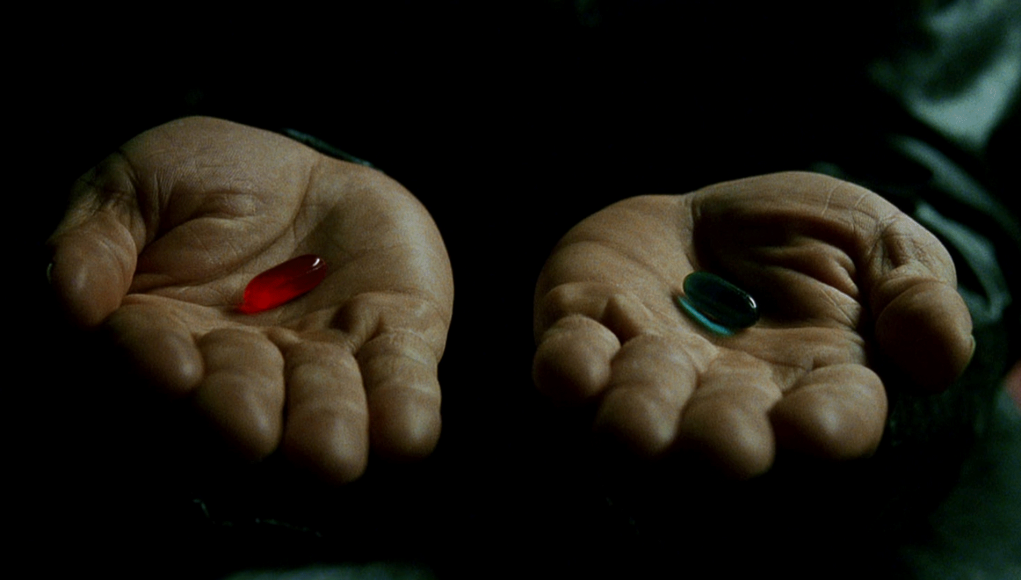If you’re interested in VR, you’ve probably thought at least once or twice about the simulation hypothesis—the idea that we might actually already be living in a virtual reality world. Many people are passingly familiar with the idea, especially thanks to films like The Matrix, and it’s been a topic among philosophers—in some form or another—for perhaps more than a millenium. But did you know that scientists actually think it may be possible to experimentally verify if we’re living in a simulation?
The simulation hypothesis was boiled down into a useful thought experiment by University of Oxford philosopher Nick Bostrom in a 2003 paper titled Are You Living in a Computer Simulation? which was published in the peer-reviewed Philosophical Quarterly journal.
In the paper, Bostrom explores the idea that—given existing trends in computing power—a far future “posthuman civilization” will likely wield immense computing power—enough to be easily capable of running simulations of billions of universes just like ours. He raises the question: if we think humanity will one day be capable of simulating billions of universes… isn’t it likely that we’re already living in one of those billions of simulations rather than being real ourselves?
It’s an intriguing formulation of the simulation hypothesis that’s frankly quite difficult to argue against. Bostrom’s paper has spurred serious discussion about the topic; it’s been cited by more than 1,000 other academic papers since its publication.
Beyond philosophers, scientists have taken the simulation hypothesis seriously too, especially in the mysterious realm of quantum physics. Several papers have hypothesized ways of actually testing if our reality is a simulation.
Pushing the Limit
In the 2012 paper Constraints on the Universe as a Numerical Simulation, published in the peer-reviewed European Physical Journal A, physicists Silas R. Beane, Zohreh Davoudi, and Martin J. Savage write that recent developments in simulating quantum interactions point toward a future where a full-fledged universe simulation is possible, which suggests that “experimental searches for evidence that our universe is, in fact, a simulation are both interesting and logical.”
According to the authors, quantum computing looks like a reasonable foundation for simulating an entire universe. But like any program, a simulated universe will have some fundamental limitations of precision. If our reality is based on a quantum computing simulation, the authors argue, we should be able to predict some of those fundamental limitations and then go searching for them in nature.
Specifically the authors say they’re looking at “the possibility that the simulations […] employ an underlying cubic lattice structure,” which is foundationally similar to small-scale quantum computing-based simulations that humanity is capable of running today. If we could observe limitations in our reality that are consistent with an underlying lattice structure for space-time, instead of a continuous space-time, the authors say it could be evidence that our universe is indeed a simulation.
The authors leave us with a tantalizing conclusion—that it may be impossible for a simulation to be fully hidden from its subjects.
“[…] assuming that the universe is finite and therefore the resources of potential simulators are finite, then a volume containing a simulation will be finite and a lattice spacing must be non-zero, and therefore in principle there always remains the possibility for the simulated to discover the simulators.”
Reality Observed Rendered
In the 2017 paper On Testing the Simulation Theory, published in the peer-reviewed International Journal of Quantum Foundations, authors Tom Campbell, Houman Owhadi, Joe Sauvageau, and David Watkinson start with a similar premise to the above conclusion—that a simulated universe likely operates with finite resources. If that’s the case, they argue, we should be looking for evidence that the behavior of our universe is consistent with a simulation optimized for computing performance.
The paper introduces a concept that will be familiar to game developers—as a matter of optimization to run a game with finite computing power, games only render what the player can see at any given moment. Anything more would be a waste that would drastically slow down the game.
The authors point out that physicists are already aware of a feature of the universe that seems suspiciously similar to rendering a game only where the player is looking. That would be the so-called Wave Function Collapse, in which fundamental particles appear to act as wave functions up until the point that they are observed, at which point their wave characteristics “collapse” and into predictable particle interactions.
The paper lays out a number of specific variations of the perplexing Double-slit Experiment, that are designed to isolate the precise role of the observer in determining the experimental outcome. The ultimate goal of the experiments is to look for a situation in which the universe would change its behavior in order to avoid creating a paradox. If this was observed, the authors argue, it would be “an indicator of a VR engine [simulated universe] reacting to the intent of the experiment.”
Further the authors suggest that finding a conflict between likely requirements of any such simulation (logical consistency and avoidance of detection) could reveal observations consistent with a simulated universe.
“Two strategies can be followed to test the simulation theory: (1) Test the moment of rendering; (2) Exploit conflicting requirement of logical consistency preservation and detection avoidance to force the VR rendering engine to create discontinuities in its rendering or produce a measurable signature event within our reality that indicates that our reality must be simulated,” the authors write.







